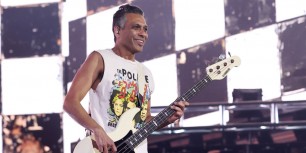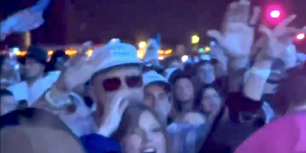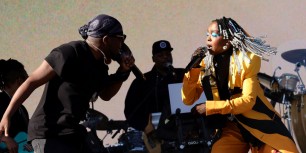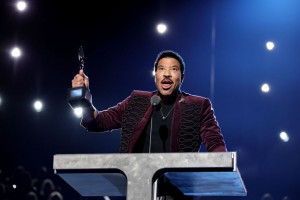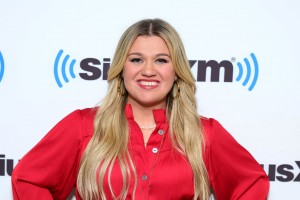Rubin "Hurricane" Carter, the wrongfully imprisoned boxer who inspired Bob Dylan's 1975 song "Hurricane," died Sunday morning at the age of 76. As the New York Times reports, Carter had been suffering from prostate cancer and died in his sleep at his home in Toronto.
As Dylan chronicles in his song, Carter was a charismatic up-and-coming middleweight contender when in June 1966, he was convicted of fatally shooting two men and a woman, who were white, at the Lafayette Grill in Carter's hometown of Paterson, New Jersey.
Carter, who had a prior criminal record, and his friend John Artis were pulled over that night after the shooters were identified as two black men. Although the surviving victim could not identify the two men as the shooters, and despite a grand jury's refusal to indict them, both ben were given life sentence from an all-white jury after two career criminals admitted to witnessing the incident.
Carter wrote about his plight while in prison. He sent his 1974 autobiography, The Sixteenth Round: From Number 1 Contender to #45472, to Dylan, who soon visited Carter in prison.
Outraged by the injustice and inspired by Carter's story, Dylan wrote the eight-minute narrative song to support the men. The epic track ended up on his album Desire, and he featured it heavily on his Rolling Thunder Revue Tour, including a show at the New Jersey prison where Carter was being held. The Revue, which also featured Joni Mitchell, Allen Ginsberg, Joan Baez and Roberta Flack, held a benefit concerts to raise money for Carter's legal defense.
During this time, the two criminal witnesses eventually admitted to being pressured into falsely identifying Carter and Artis in return for leniency in their own cases. Finally, the New Jersey Supreme Court overturned their guilty convictions in 1976 and ordered a retrial. However, during the second trial, one of the witnesses went back on his recantation, and the two men were found guilty once more.
The case became highly publicized, and after nine years of appealing their case, a federal court tried the Carter again in 1985 (Artis had been released on parole four years prior). The judge ruled that the prosecutors had "fatally infected the trial" by promoting "an appeal to racism rather than reason and concealment rather than disclosure."
The conviction was overturned, Carter was set free, and the charges were formally dismissed in 1988.
Following his release, Carter became an activist for criminal justice causes. In the weeks before his death, he campaigned for the exoneration of David McCallum, a Brooklyn man convicted of murder who had been in prison since 1985.
Carter published an opinion article on February 21, 2014 in The Daily News, headlined "Hurricane Carter's Dying Wish." He requested that McCallum "be granted a full hearing" by Brooklyn's new district attorney, Kenneth P. Thompson. "If I find a heaven after this life, I'll be quite surprised," he wrote. "In my own years on this planet, though, I lived in hell for the first 49 years, and have been in heaven for the past 28 years. To live in a world where truth matters and justice, however late, really happens, that world would be heaven enough for us all."
Listen to Dylan's "Hurricane" below:

